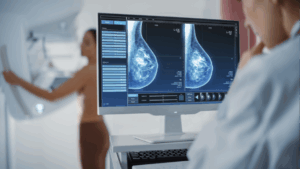Because MRIs are loud, enclosed, and take a long time to complete, many people may have the impression that MRIs can be dangerous. Relative to X-rays or CT scans, MRIs do not use radiation, and therefore lack any risk of radiation exposure.
Because MRIs are loud, enclosed, and take a long time to complete, many people may have the impression that MRIs can be dangerous. Relative to X-rays or CT scans, MRIs do not use radiation, and therefore lack any risk of radiation exposure.
In general, the MRI machine is considered a very safe imaging device. However, because the machine conducts its imaging by way of a powerful magnet, there are some risks associated with an MRI scan, including:
Presence Of Metallic Fragments
The strong magnetic field used by the MRI machine can attract metal objects in the room. Thus, a careful screening of the room and of anybody entering is absolutely essential for the safety of the patient and the equipment.
Additionally, fragments embedded in parts of the body such as shrapnel or bullets can be affected.
Metal Implants & Medical Devices
While MRI exams are perfectly safe for most, they present a unique safety hazard for individuals with medical devices, such as pacemakers or cochlear implants. The magnetic field used by the MRI machine can affect medical devices in various ways, including:
- Pulling on these devices and creating unwanted movement
- The radiofrequency energy from the machine can cause heating of implanted medical devices, which can lead to burns of surrounding tissues
- The energy can also cause a malfunction in electrically active medical devices, which may lead to a disruption in the device’s intended functions
- Embedded medical devices can also degrade the quality of the image produced by the machine, which may lead to an inaccurate clinical reading
Some medical devices are identified as MR Safe or MRI Conditional. These devices do not interact negatively with the MRI environment. Otherwise, your doctor will advise you to use a different test.
Pregnancy
If you know or suspect that you’re pregnant, you should talk to your doctor. Magnetic resonance imaging can raise the temperature of the amniotic fluid, and MRIs are therefore not recommended for pregnant women.
Possible Hearing Damage
One of the most disconcerting things about getting an MRI scan is the loud knocking sounds produced by the machine. If you do not wear adequate ear protection, you could experience damage to your hearing.
Allergic Reaction To Contrast Dye
The contrast dye used in magnetic resonance imaging has the potential to trigger an allergic reaction in some patients. Individuals who know that they are allergic to contrast dye or have a sensitivity to iodine or shellfish should notify their physician before taking the MRI exam.
Epilepsy
The bright lights and loud knocking sounds associated with an MRI machine are extremely dangerous for individuals prone to seizures, so MRIs are not advised for patients with a history of epilepsy.
Claustrophobia
The confined space of the MRI machine can trigger claustrophobia in some patients. If you are prone to claustrophobia, let your doctor know.
They may be able to prescribe a medication to make the experience more comfortable for you.
Adverse Events
While it is very rare, adverse events from MRI scans do occur. Most events reported are thermal injuries, which are typically minor burns from the heating element of MRIs.
Occasionally, projectile damage from the magnetic fields are reported, as is hearing loss.
MRI Scans Are Generally Safe
While we have discussed a number of possible dangers associated with magnetic resonance imaging, the bottom line is that the procedure is generally safe. And now that you’re familiar with MRI safety, you can schedule your MRI at One Step Diagnostic today with peace of mind.




